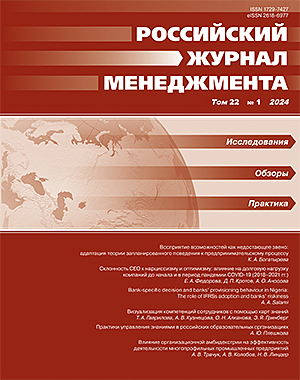Восприятие возможностей как недостающее звено: адаптация теории запланированного поведения к предпринимательскому процессу
DOI:
https://doi.org/10.21638/spbu18.2024.101Аннотация
Цель исследования: определение роли восприятия предпринимательских возможностей в контексте теории запланированного поведения применительно к предпринимательскому процессу.
Методология исследования: для проведения исследования использованы данные российской части проекта «Глобальный мониторинг предпринимательства», собранные в период турбулентности 2021 г., вызванной пандемией COVID-19. В качестве методов эмпирического анализа применены логистическая регрессия, моделирование методом наименьших квадратов, а также техники для тестирования медиационных эффектов.
Результаты исследования: уточнена теория запланированного поведения применительно к предпринимательству. В частности, определены направления взаимосвязей между самоэффективностью, оценкой отношения общества к предпринимательству, страхом провала и формированием предпринимательских намерений и переходом к действиям по созданию бизнеса с учетом восприятия предпринимательских возможностей.
Оригинальность и вклад авторов: значимость исследования заключается в уточнении механизмов, определяющих развитие предпринимательского процесса на ранних стадиях. Исследование также вносит вклад в литературу, посвященную предпринимательским возможностям, анализируя их роль на этапе зарождения новой фирмы.
Ключевые слова:
предпринимательские возможности, бизнес-возможности, восприятие предпринимательских возможностей, теория запланированного поведения, предпринимательские намерения, действия по созданию бизнеса, «Глобальный мониторинг предпринимательства»
Скачивания
Библиографические ссылки
References in Latin Alphabet
Translation of references in Russian into English
Загрузки
Опубликован
Как цитировать
Выпуск
Раздел
Лицензия
Статьи журнала «Российский журнал менеджмента» находятся в открытом доступе и распространяются в соответствии с условиями Лицензионного Договора с Санкт-Петербургским государственным университетом, который бесплатно предоставляет авторам неограниченное распространение и самостоятельное архивирование.





